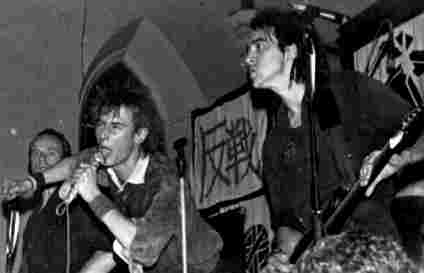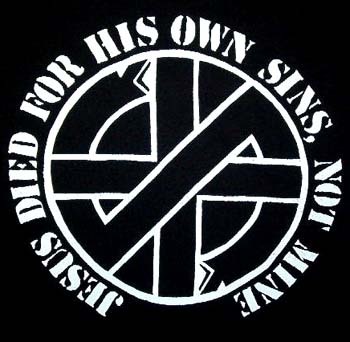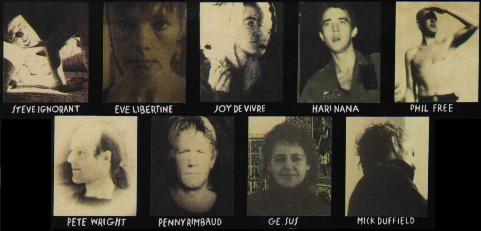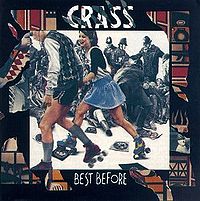As part of the process of getting ready for our impending move, I’ve been engaged in a process of ripping all my audio CDs that hadn’t previously been ripped. This keeps leading to my having that “Oh, I haven’t though about you in a while” experience.
I had that recently with Crass.

Since I was single-digits old when the whole punk thing was happening, and even when Crass came along toward the end of period, I have no experience of any of this stuff when it happened.
I think I vaguely remember the Thatchergate incident–listening to the audio in that Wikipedia entry some bells ring–but even then I was less than 10 years old, so it wouldn’t have made a particular impression on me if I heard it at the time.
No, for me, Crass goes back to a friend’s basement around 1990, when someone much more in-the-know about the history of punk sat me down and played Reality Asylum for me.
I think it was probably because I was a cocky atheist even then–perhaps even more cocky than I am now–and he thought I would appreciate the blasphemous elements. Or maybe it was just that I was a pretty innocent kid, despite what I might have thought at the time, and he thought it might be fun to shock me.

I don’t know that the contents are shocking now, or even in 1990 for most people, but they were apparently shocking at the time the track was first released:
Crass’ first release was The Feeding Of The 5000, an 18 track 12″ 45 rpm EP on the Small Wonder label in 1978. Workers at the pressing plant initially refused to handle it due to the allegedly blasphemous content of the song “Reality Asylum”. The record was eventually released with this track removed and replaced by two minutes of silence, ironically titled “The Sound Of Free Speech”. This incident prompted Crass to set up their own independent record label, Crass Records, in order to retain full editorial control over their material. “Reality Asylum” was shortly afterwards released on Crass Records in a re-recorded and extended form as a 7″ single. Later pressings of the album (also on Crass Records) restored the original version of the missing track.
Whatever else you might think, the band’s handling of that was pretty cool: if someone pulls out the Liebling quote–“Freedom of the press is guaranteed only to those who own one.”–then you bloody well start your own press, as ’twere.
 And it did shock me–I had read things that were much more challenging to conventional mores than the lyrics of the track, but somehow to hear someone speak it aloud made it seem so much more transgressive. And the fact that the vocalist was a woman (“Eve Libertine“, see pics at left) also seemed to make it more shocking somehow
And it did shock me–I had read things that were much more challenging to conventional mores than the lyrics of the track, but somehow to hear someone speak it aloud made it seem so much more transgressive. And the fact that the vocalist was a woman (“Eve Libertine“, see pics at left) also seemed to make it more shocking somehow
The track certainly made an impression on me–enough that I wanted to own a copy, if for no other reason than because it seemed to be outside the lines. That same impetus had me buying Justine and other things that were on the Index
Of course there was little chance in 1990 of finding a Crass disc for sale in the small northern town I grew up in

Years later, during my undergrad studies, I ran into the self-awarely titled Best Before 1984 compilation, and that triggered the memory, so I bought a copy. I probably listened to it once or twice and then put it on the shelf, where it’s been sitting since. Until now.
Doing a little Googling in order to write this up, I see that Penny Rimbaud, one of the founders of Crass and the guy who wrote Reality Asylum, later expanded it into a 45 minute spoken word piece. I wonder if I could track that down on the Internets as easily as you can find the album version… (Apparently it’s being worked on for rerelease anyway.)
Speaking of the album version, after this discussion I suppose I should give you a chance to experience it if you haven’t. Instead of hosting the mp3, I’ll just embed a link to a fan-created video for the piece. I don’t know if the experience will be different with video if it’s the first time you hear it, but if you’re worried then listen with your eyes closed. If you need to see lyrics, they are available from all the usual places.
It doesn’t seem so shocking now–actually seems a bit more childish I guess, like a little kid saying bad words to provoke a reaction from the parents, but I can remember being shocked by it, and I imagine it hit even harder in its day. Still, I can’t imagine that having the track in handy mp3 form will result in my listening to it any more in the next decade than I did in the last. It’s not really something that stands up to heavy rotation.
More than anything else I now wonder about the people who were involved and the stories that would have sprung up at the time–I mean you take a bunch of people with names like Joy de Vivre, Eve Libertine, Penny Rimbaud, Steve Ignorant, and so on, and have them be punk musicians, radical social activists, situationist pranksters, and commune dwelling freaks, and there must have been a few interesting stories.
Pulling out the CD and ripping it made me think over all of this. And then, the next day, I got a copy of the new PM Press catalog, and what is featured in there? The Story Of Crass. I think that synchronicity is what prompted this post.
How do you say no to something with a pull quote like this?
“Lucid in recounting their dealings with freaks, coppers, and punks the band’s voices predominate, and that’s for the best.” –The Guardian UK
and solicitation text like this?
Crass was the anarcho-punk face of a revolutionary movement founded by radical thinkers and artists Penny Rimbaud, Gee Vaucher and Steve Ignorant. When punk ruled the waves, Crass waived the rules and took it further, putting out their own records, films and magazines and setting up a series of situationist pranks that were dutifully covered by the world’s press. Not just another iconoclastic band, Crass was a musical, social and political phenomenon.
Commune dwellers who were rarely photographed and remained contemptuous of conventional pop stardom; their members explored and finally exhausted the possibilities of punk-led anarchy. They have at last collaborated on telling the whole Crass story, giving access to many never-before seen photos and interviews.
I’ll probably pick up a copy of that, give it a read, and then put it on the shelf for a decade. Heh.


1 comment for “A Reflection On Pleasant Punk Blasphemy”